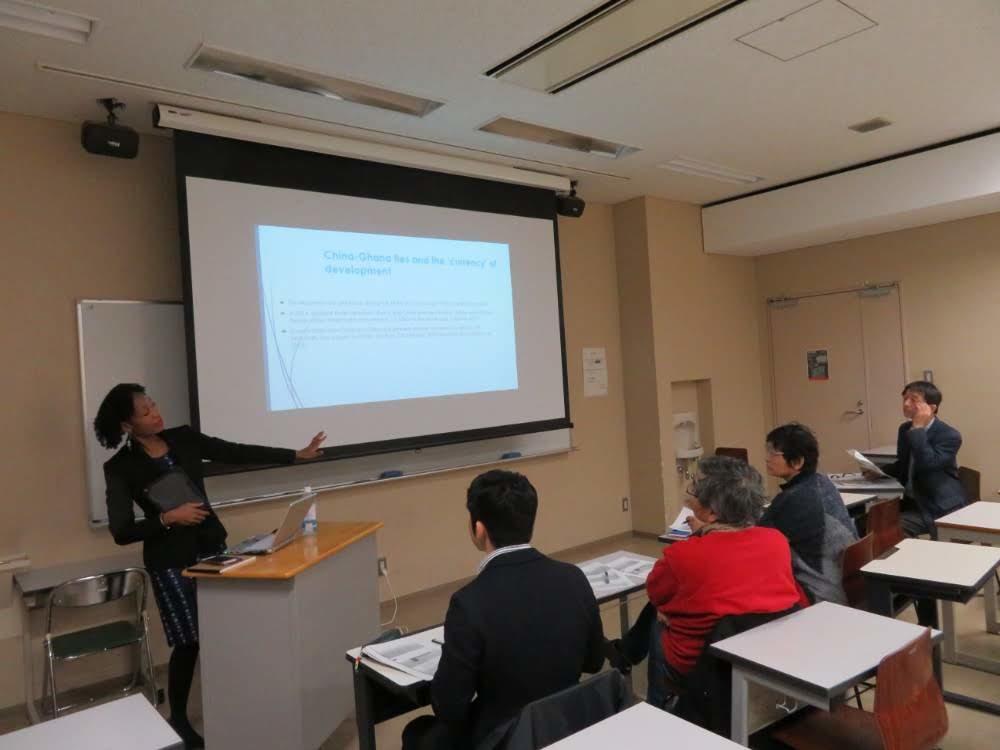Date & Time: Tuesday, January 15, 2019 5:40 - 7:10 pm
Venue: Room 104, Research and Lecture Building, Tokyo University of Foreign Studies
Speaker: Dr. Naaborle Sackeyfio (Assistant Professor, Department of Global and Intercultural Studies, Miami University)
Theme: Negotiating power and agency in Ghana's Asian nexus
Report:

On her invitation by African Studies Center to deliver a public lecture at Tokyo University of Foreign Studies, Dr. Naabarle Sackeyfio, Professor of Miami University of Ohio, talked on the theme: "Negotiating Power and Agency in Ghana's Asian Nexus." Dr. Sackeyfio began her lecture with a rhetorical question- Can the growing prominence of model states like Ghana manage a resource oriented political economy that features donor and path dependent development? She argued on two points, on the one hand, she asserted that, Ghana's ascendance will depend on how well it protects its agency in an era where runaway development and extractive economy may imperil Ghana's prominence in the 21st Century. One the other hand, Dr. Sackeyfio also opined that, despite the difficulty of replication, Japan's trajectory offers potent institutional lessons that augur well for Ghana's ongoing development.
Whilst succinctly expatiating on Ghana within its historical context, Dr. Sackeyfio mentioned that, the country's emergence as a pivotal regional and continent actor was buoyed by its pan-African credentials through the country's first post-independent and nationalist leader, Kwame Nkrumah. In the wake of politics of the 21st Century, Dr. Sackeyfio specified that, the country's market-oriented reforms including a widened scope for privatization and shrinkage of the state have more to do with shrewd political calculation of particular regimes in the form of strategic non-compliance.
Within the context of comparing Japan and China, Dr. Sackeyfio stipulated that, as a model state for newly industrializing economies in the 1970s, Japan became a cause celebre for developing countries around the globe. Furthermore, she also indicated that China rising status as a pivotal global economic player trouncing Japan and United States was unprecedented but at the same time, China's geopolitical interest is highly contested, while Japan whose post war success catapulted the country to the much heralded "East Asian Miracle" aim to flex its economic muscle on the continent. Dr. Sackeyfio likewise elaborated that, both Japan and China's contemporary relationship with Ghana is rooted in the 1955 Bandung Conference at which Asian states sought closer connection to Africa states for political support, and that both states ate unique positioned to forge meaningful economic alliance with African countries given a non-western trajectory as they played no role in the continent's colonization.
In her conclusion, Dr. Sackeyfio echoed that, the growth of participatory institutions in Ghana offers a paradox of agency and that, Ghana's trajectory is imperiled by potential sovereign wealth "givenaways" in the form of land, mining rights and more in exchange for infrastructural development and for the most part, the Sino-Ghanaian relationship and Sino African relationships remain asymmetrical. And therefore, Ghana is a good premier for beginning the necessary conceptualization of the Pan-African future that utilizes its own wealth via technological advances, and infrastructural development directed from within.

